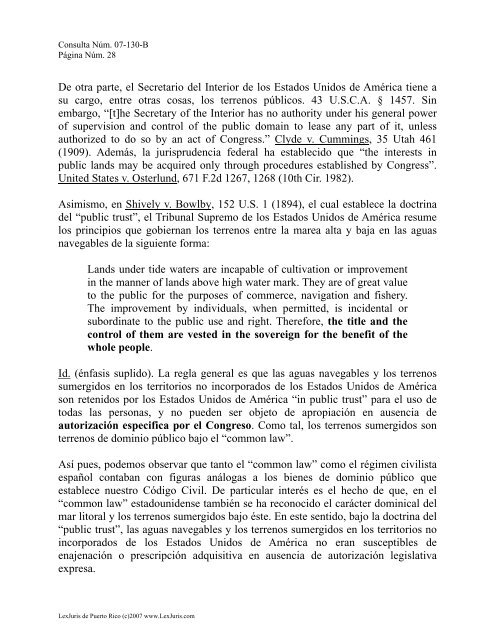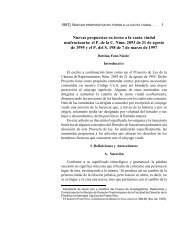OSJ-2007-pc Opinión sobre titularidad de terrenos ... - LexJuris
OSJ-2007-pc Opinión sobre titularidad de terrenos ... - LexJuris
OSJ-2007-pc Opinión sobre titularidad de terrenos ... - LexJuris
Create successful ePaper yourself
Turn your PDF publications into a flip-book with our unique Google optimized e-Paper software.
Consulta Núm. 07-130-B<br />
Página Núm. 28<br />
De otra parte, el Secretario <strong>de</strong>l Interior <strong>de</strong> los Estados Unidos <strong>de</strong> América tiene a<br />
su cargo, entre otras cosas, los <strong>terrenos</strong> públicos. 43 U.S.C.A. § 1457. Sin<br />
embargo, “[t]he Secretary of the Interior has no authority un<strong>de</strong>r his general power<br />
of supervision and control of the public domain to lease any part of it, unless<br />
authorized to do so by an act of Congress.” Cly<strong>de</strong> v. Cummings, 35 Utah 461<br />
(1909). A<strong>de</strong>más, la jurispru<strong>de</strong>ncia fe<strong>de</strong>ral ha establecido que “the interests in<br />
public lands may be acquired only through procedures established by Congress”.<br />
United States v. Osterlund, 671 F.2d 1267, 1268 (10th Cir. 1982).<br />
Asimismo, en Shively v. Bowlby, 152 U.S. 1 (1894), el cual establece la doctrina<br />
<strong>de</strong>l “public trust”, el Tribunal Supremo <strong>de</strong> los Estados Unidos <strong>de</strong> América resume<br />
los principios que gobiernan los <strong>terrenos</strong> entre la marea alta y baja en las aguas<br />
navegables <strong>de</strong> la siguiente forma:<br />
Lands un<strong>de</strong>r ti<strong>de</strong> waters are incapable of cultivation or improvement<br />
in the manner of lands above high water mark. They are of great value<br />
to the public for the purposes of commerce, navigation and fishery.<br />
The improvement by individuals, when permitted, is inci<strong>de</strong>ntal or<br />
subordinate to the public use and right. Therefore, the title and the<br />
control of them are vested in the sovereign for the benefit of the<br />
whole people.<br />
Id. (énfasis suplido). La regla general es que las aguas navegables y los <strong>terrenos</strong><br />
sumergidos en los territorios no incorporados <strong>de</strong> los Estados Unidos <strong>de</strong> América<br />
son retenidos por los Estados Unidos <strong>de</strong> América “in public trust” para el uso <strong>de</strong><br />
todas las personas, y no pue<strong>de</strong>n ser objeto <strong>de</strong> apropiación en ausencia <strong>de</strong><br />
autorización especifica por el Congreso. Como tal, los <strong>terrenos</strong> sumergidos son<br />
<strong>terrenos</strong> <strong>de</strong> dominio público bajo el “common law”.<br />
Así pues, po<strong>de</strong>mos observar que tanto el “common law” como el régimen civilista<br />
español contaban con figuras análogas a los bienes <strong>de</strong> dominio público que<br />
establece nuestro Código Civil. De particular interés es el hecho <strong>de</strong> que, en el<br />
“common law” estadouni<strong>de</strong>nse también se ha reconocido el carácter dominical <strong>de</strong>l<br />
mar litoral y los <strong>terrenos</strong> sumergidos bajo éste. En este sentido, bajo la doctrina <strong>de</strong>l<br />
“public trust”, las aguas navegables y los <strong>terrenos</strong> sumergidos en los territorios no<br />
incorporados <strong>de</strong> los Estados Unidos <strong>de</strong> América no eran susceptibles <strong>de</strong><br />
enajenación o prescri<strong>pc</strong>ión adquisitiva en ausencia <strong>de</strong> autorización legislativa<br />
expresa.













